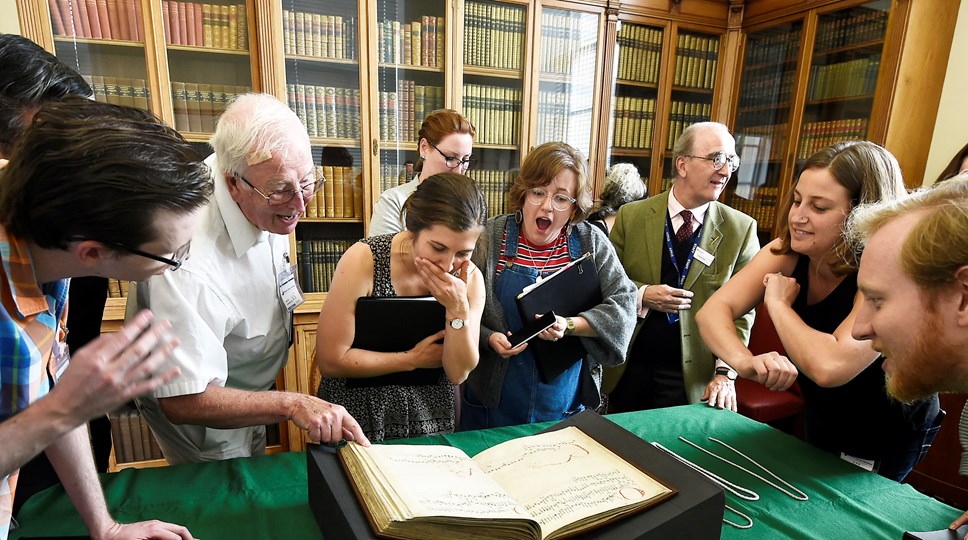
National Library boosts growth in reaching people
The National Library of Scotland launched its new strategy today, with an accelerated focus on reaching people through outstanding digital engagement. This follows a record-breaking surge in visits to the Library’s websites and digital collections over the past six months – a rise of 40 per cent on 2019 figures.
Today’s launch also follows news that the Conference of European National Librarians has accepted the National Library of Scotland for membership. The Library can now fulfil a long-held ambition to work with its European counterparts in preserving the continent’s cultural heritage and making it accessible to all.
Reaching People: Library Strategy 2020-2025, builds upon the Library’s successes over the past five years, and looks towards its centenary in 2025, by which time a growing number of Scottish residents will enjoy a personalised online service tailored towards their needs and interests. This work will complement increased activity in the Library’s redeveloped buildings and out in the community to reach and welcome new audiences.
National Librarian, Dr John Scally, returned to the Library as Chief Executive six years ago. He was instrumental in pivoting the Library towards the rapid development of the digital library, as well as growing numbers of visitors to exhibitions, events and touring displays. He said:
“This new strategy takes us up to our centenary in 2025. This major anniversary prompted us to think carefully about what the Library should look like in 2025. We consulted far and wide and were told to keep doing what we’re doing, but that we could reach more people by introducing new cultural experiences, expanding our digital offer, and getting more partners involved. We have reflected this view in the new strategy, as we continue to reshape ourselves to respond to our growing audiences, while remaining true to our core mission as the guardian of the printed and recorded memory of Scotland.
“We have seen this year how important it is that we are prepared for rapid change, which requires flexibility and creative thinking. Our response to the Covid-19 pandemic demonstrated an agility that will frame our thinking for the next decade.
“Our key priority for the next five years is to connect with people and enrich their lives. We want to be responsive and inclusive. We want to be current and relevant. We very much value our growing number of regular visitors and readers, however we know we can offer more to an even greater number of people. In five years’ time we will look and feel like a different place – one where community groups, families with young children and people of all ages and backgrounds will feel it is their national library – their place to enjoy and to access a world of knowledge and entertainment.
“We are a national library and we strive to serve the whole of Scotland.”
The strategy encompasses five priorities:
Safeguarding collections. Areas of focus for the next five years include preserving some of the nation’s most fragile formats – moving image, sound, and newspapers. Addressing historic biases in the collections and renewed efforts to collect a greater variety of stories and voices across Scotland will also be a major focus. At its core, the Library will continue to develop its role as Scotland’s legal deposit library, acquiring a copy of everything published in the UK.
Improving access. The Library has already begun by moving its planned events, exhibitions, educational and family activities online over the past six months. Its online events programme has reached thousands of people across 58 countries. Librarians continued working remotely throughout lockdown to help people access and navigate the digital collections. This is set to continue. By 2025, people will find it much easier to join the Library and get the most out of its services.
Engaging audiences. This is the core priority for the Library for the next five years. Plans include reaching communities throughout Scotland with the collections and public programming, taking an audience-led approach to tailoring its services and cultural experiences, and further developing its public spaces as welcoming destinations for research, lifelong learning, discovery and entertainment.
Supporting learning, research and discovery. The Library will continue to improve the twin priorities of supporting learners and researchers, giving them easy access to what they need, making everything easy to find, simple to use, and only a click or a visit away. The Library’s Data Foundry – home of the collections as data – points to the future. It will be an area of focus for the next five years.
Developing the organisation. The Library will build on its commitment to be a place for training, development and work experience, especially for young people. The Library has just recruited a cohort of paid interns for the next six months to help progress its priorities for the years ahead. They will work in the areas of climate change, media, access, data and rights clearances, equalities and inclusion, and Gaelic translation. The Library will in turn help the interns progress with their careers.
Another major focus in this area is to continue to work towards the Government’s aim of becoming carbon-neutral by 2040. The Library is on track with this work – since 2008/09, it reduced greenhouse gas emissions by 69 per cent, and reduced energy consumption by 50 per cent.
To read the full strategy, visit the Library’s website.
Contact Information
Notes to editors
The National Library of Scotland
The National Library of Scotland is a major European research library and one of the world’s leading centres for the study of Scotland and the Scots – an information treasure trove for Scotland’s knowledge, history and culture.
The Library’s collections are of world-class importance. Key areas include rare books, manuscripts, maps, photographs, music, moving images, official publications, science and technology, and modern and foreign collections.
The Library holds more than 30 million physical items dating back over 1000 years in addition to a growing library of digital material. Every week the Library collects around 5,000 new items. Most of these are received in terms of Legal Deposit legislation, allowing the Library to claim a copy of everything published in the UK and Ireland (everything from children’s books to science journals, election leaflets to magazines and websites). www.nls.uk / @natlibscot / facebook
